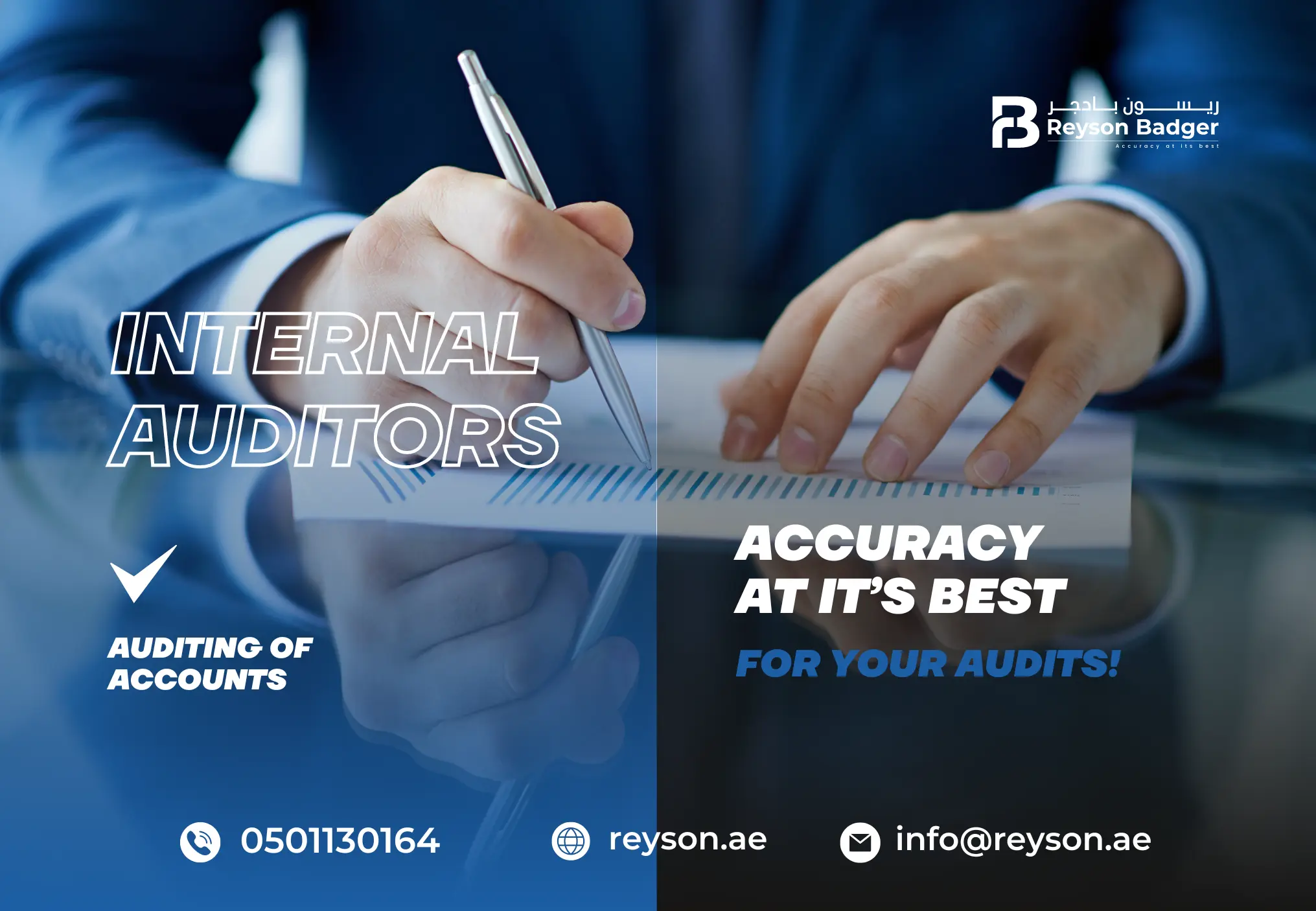
Internal auditing is a structured process that evaluates an organization’s operations, ensuring compliance, efficiency, and risk management. It plays a crucial role in strengthening governance, managing risks, and improving control processes within an organization.

With the UAE’s evolving regulatory environment and growing business sector, the need for a strong internal audit framework has never been more crucial. A well-structured internal audit function helps businesses identify potential risks, enhance operational efficiency, and maintain compliance with industry standards, ultimately contributing to long-term success.
The regulatory framework governing internal audits in the UAE is overseen by several key bodies, including the Accountability and Audit Authority (ADAA), the UAE Ministry of Economy, and the Central Bank.
In terms of relevant laws and standards, internal auditing practices in the UAE are guided by the International Standards on Auditing (ISA) and the Standards on Internal Audit (SIAs). These standards provide a framework for conducting internal audits, ensuring independence, objectivity, and professionalism.
The Federal Decree-Law No. (20) of 2018 on Anti-Money Laundering and Combating the Financing of Terrorism and Illegal Organizations is another crucial law that internal auditors must comply with.
To ensure compliance, businesses operating in the UAE must adhere to the following requirements:
By complying with these regulations and standards, businesses in the UAE can ensure the integrity and transparency of their internal auditing practices.
Internal auditing is a systematic and independent evaluation of an organization's operations, aimed at providing assurance on the effectiveness of governance, risk management, and control processes. The primary objectives and scope of internal auditing include:
Assessing the Effectiveness of Governance Structures
Internal auditing plays a critical role in assessing the effectiveness of an organization's governance structures. This involves evaluating the board's oversight and management's stewardship, as well as assessing the organization's culture and values. By reviewing governance policies and procedures, internal auditors can identify areas for improvement and provide recommendations to enhance governance effectiveness.
Evaluating Risk Management Strategies and Their Implementation
Evaluating risk management strategies and their implementation is another key objective of internal auditing. This involves identifying and assessing key business risks, evaluating the effectiveness of risk management strategies, and reviewing risk mitigation and control measures. By providing an independent assessment of risk management practices, internal auditors can help organizations identify and mitigate potential risks.
Reviewing Internal Controls and Operational Efficiencies
Internal auditors review internal controls and operational efficiencies to ensure that an organization's operations are running smoothly and efficiently. This involves assessing the design and operating effectiveness of internal controls, evaluating operational efficiencies, and identifying areas for improvement. By providing recommendations for improvement, internal auditors can help organizations streamline their operations and reduce costs.
Ensuring Adherence to Legal and Regulatory Requirements
Ensuring adherence to legal and regulatory requirements is a critical objective of internal auditing. This involves reviewing compliance with relevant laws, regulations, and standards, assessing the effectiveness of compliance policies and procedures, and identifying and reporting on compliance breaches or deficiencies. By providing assurance on compliance, internal auditors can help organizations avoid reputational damage and financial penalties.
Here are the types of internal audit services, categorized and described:
Quality Audits
Reyson Badger is a renowned audit firm in the UAE, offering accounting and auditing services to businesses of all sizes. With a strong presence in Dubai, they provide expertise in auditing, accounting, and financial advisory services .
HLB HAMT
HLB HAMT is a reputable auditing firm established in Dubai since 1999. They offer top-tier audit and consultancy services, including financial statement audits, management consulting, business setup, VAT compliance, and IT consulting .
PKF UAE
PKF UAE is a leading audit firm in Dubai, providing a range of services including auditing, accounting, tax advisory, and business consulting. They are recognized for their expertise in serving various industries, including real estate, hospitality, and healthcare.
Crowe UAE is a prominent audit firm in Dubai, offering audit, tax, and advisory services to businesses. They have a strong reputation for providing high-quality services, with expertise in serving various industries, including financial services, manufacturing, and technology .
CDA Audit is a leading audit firm in Dubai, providing quality auditing, accounting, and business consulting services. They have a team of seasoned chartered accountants and experts in auditing and accounting, offering tailored solutions to meet clients' specific needs.
Common Industry-Agnostic Considerations
Reyson Badger provides expert internal auditing services to help businesses in Dubai stay compliant, reduce risks, and improve efficiency. Our team ensures that your financial records, internal processes, and company policies follow the highest standards, helping your business grow with confidence.
We offer a range of internal audit services to meet the needs of businesses in Dubai. Our services include risk assessment, process evaluation, compliance checks, financial audits, and advisory support. We help businesses find and fix weaknesses, improve operations, and follow all required regulations.
The primary purpose of internal audit services is to provide businesses with an independent and objective assessment of their internal processes, financial health, and regulatory compliance. Internal audits help organizations detect weaknesses, strengthen governance, and improve decision-making by offering valuable insights into operational and financial risks. In Dubai’s dynamic business environment, having a strong internal audit function is essential for maintaining transparency, efficiency, and long-term growth.
Internal audit services play a vital role in ensuring compliance, managing risks, and enhancing business operations in the UAE. A well-structured internal audit function helps organizations identify inefficiencies, strengthen financial controls, and align with regulatory requirements. By investing in robust internal audit solutions, businesses can safeguard assets, maintain transparency, and drive long-term sustainable growth.
At Reyson Badger, we provide expert internal auditing services tailored to your business needs, ensuring accuracy, compliance, and operational efficiency. Get in touch with us today to strengthen your internal audit framework and take your business to the next level.
Internal auditing provides an independent and objective assessment of an organization's internal controls, risk management processes, and governance procedures. It identifies areas for improvement, evaluates the effectiveness of internal controls, and provides recommendations to enhance overall performance and efficiency.
The frequency of internal audits depends on:
Internal audits are not always mandatory but are recommended as a governance and risk management best practice. Regulatory bodies and standards such as SOX, COSO, ISO, and IIA often require internal audits.
Internal audit identifies areas for improvement, while ISO audit provides a framework for implementing best practices, ensuring compliance, and driving continuous improvement in organizational processes and systems.
Internal audit firms provide internal audit services, including risk assessment, control evaluation, and process improvement, helping organisations achieve their objectives and ensure regulatory compliance.
Internal audit services can help organizations achieve ISO 9001 certification by conducting gap analyses, identifying areas for improvement, and ensuring compliance with Quality Management System (QMS) requirements. This enables organizations to demonstrate their commitment to quality and customer satisfaction.
Internal audit services play a critical role in maintaining ISO 27001 certification by conducting regular audits to ensure ongoing compliance with Information Security Management System (ISMS) requirements. This helps organizations identify and mitigate potential security risks, ensuring the confidentiality, integrity, and availability of sensitive data.
Reyson Badger's team of experienced professionals, tailored approach, and commitment to delivering exceptional results set them apart from other internal audit consulting services.